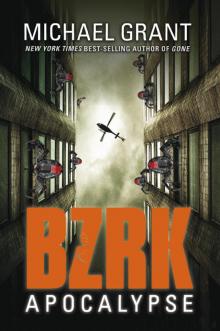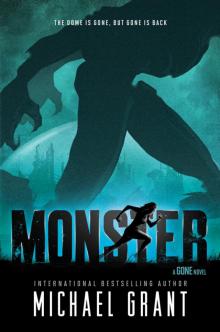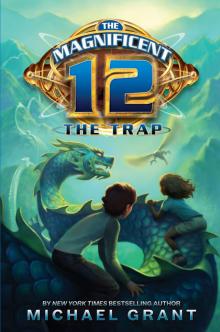- Home
- Michael Grant
Purple Hearts Page 5
Purple Hearts Read online
Page 5
“You’re a little old to play my fiancé,” Rainy says bluntly.
Étienne makes a rude noise. “We lost almost two million men in the first war, mademoiselle, and two hundred thousand plus more than a million prisoners in this war; most of the able-bodied men have been sent off to work in German factories as little better than slaves. There are not so many French men left that you can be choosy.”
Rainy nods acceptance.
“It will be very dangerous,” Étienne says. “If we are caught . . . well, you cannot imagine what the Gestapo does to prisoners.”
Rainy doesn’t like his superior tone at all. And she does not wish to spend the next week or more being condescended to—she’s had quite enough of being treated like a second-class citizen because of her sex. She raises the little gas lantern from the table and holds it close to her face. The light picks out the small scar that bisects her lower lip, and the scar where surgeons went in to mend her broken jaw. She pulls back her hair to reveal a scar on the side of her neck. Then, she unfastens the top buttons of her dress and pulls the collar aside to show the crooked collarbone beneath a mass of scar tissue. There’s more, much more, but this much will do.
“I know exactly what the Gestapo does to prisoners,” Rainy says.
Étienne falls silent and withdraws from the circle of light. Marie edges closer, fascinated and horrified. But it is Faisan who rises, comes near, and with surprising tenderness touches the bump of her badly healed collarbone.
He then raises his hand from her shoulder, and turns it so she can see that there are no nails on his fingers. Tearing out fingernails is a favorite of Nazi torturers.
“Pour us two glasses,” Faisan says, and Marie complies. Faisan hands one to Rainy, takes the other himself. He makes no toast, says nothing at all, but their eyes meet, his old and sick, hers young and still vital. The old French smuggler and the young female lieutenant in the US Army have nothing to say to each other that can be turned into words.
They drink. He lifts the Walther from the table and hands it back to Rainy.
“Eh bien,” Faisan says with a sigh. “Dépêchez vous.”
Get going.
4
FRANGIE MARR—LST 86, PORTSMOUTH HARBOR, UK
“You’re killing me, Doc. You’re killing me dead.”
Sergeant Frangie Marr, frequently known as “Doc,” stands before a tier of bunks six high. The lowest one is occupied by a black man with the extravagant name of Vanderbilt DeRay, who looks like someone who has crawled to hell, spent a week, and just got back.
Frangie Marr has seen many a combat wound in her time as an army medic, but even gut-shot GIs often looked better than a GI who’d been desperately seasick for forty-eight hours. Seasick without even leaving port, except for a false launch that had to be called back due to bad weather.
The air in the hold of the LST reeks of gasoline, engine fumes, human feces from a malfunctioning bathroom—called a “head” aboard ship—human sweat, and human vomit, and it is so thick with cigarette smoke that Frangie doubts it contains enough oxygen to sustain human life. That is bad enough.
Worse, far worse, is the fact that no part of the big steel box designated Landing Ship Tank 86 is standing still. The flat-bottomed LST rises and falls on every swell, rocks and rolls on the wake of every passing ship. The floor is alive beneath her feet, a surging, heaving, sliding fun house ride that has every single susceptible person aboard spewing seemingly endless buckets of vomit.
Some are blessedly immune, and are cordially hated by the sufferers. Some are in a sort of middle zone: queasy at times, maybe needing a relatively decorous and controlled vomit once or twice a day. Others . . . well, others lay prostrate in their own bodily fluids, weak, pathetic, fragrant, and a burden to themselves and everyone else.
“Did you take your pills?” Frangie demands in her Official Medical Voice.
“I did, Doc. You gotta get me a dose of that medical bourbon you got.”
“It’s rum, not bourbon, and—”
“Well, that’s just foolish,” Vanderbilt DeRay says, frowning and shaking his head. “You don’t want rum if you got decent corn whiskey. Maybe something with some age on it, to mellow the flavor . . .”
“Sergeant DeRay,” Frangie says sternly. “Alcohol is not a cure for seasickness. In fact, given your condition, and the fact that you stink of moonshine, I’d say you have been treating yourself with homemade hooch. And it does not seem to have worked, because you are the greenest black man I’ve ever seen.”
This brings laughter from soldiers bunked above, and to the left, and the right, and behind. Of course only the immune can laugh, and since Frangie herself is Category Two: queasy and barely maintaining, she is not fond of soldiers who can ride this sluggish roller coaster night and day and still laugh.
She snarls at them over her shoulder, but while Frangie commands respect for her skills, she is still the smallest person in the battalion, and known for being kind and easygoing besides, and her snarl scares no one.
Frangie has been assigned to an all-black tank battalion—all colored troops aside from some of the most senior officers. The battalion is composed of seven Sherman M4 medium tanks, six Sherman DDs (the amphibious version of the Sherman fitted with a flotation skirt), five Stuart light tanks, an independent squad of assault guns (modified Shermans), four Tank Recovery Vehicles (Shermans with cranes welded on), and three half-tracks mounting 81 millimeter mortars and machine guns. In addition to all those killing tools, the battalion had a long trail of supply trucks and maintenance and repair squads with their own specialized gear, and a gaggle of jeeps, one of which will be Frangie’s.
And of course two extra-nice Sherman M4s for the battalion commander and his operations chief.
Frangie is a medic, not a nurse and definitely not a doctor, and she is not in any way specially qualified to treat seasickness (no one really is), but what sick GIs want most—aside from medical booze—is attention from someone with at least some medical standing, and Frangie is happy to play the part. However powerless she might be.
Frangie leaves the sickly sergeant and winds her way up on deck into lashing rain and blustery wind. The upper deck is covered with trucks and jeeps, with the much heavier tanks down below on the tank deck. Canvas covers on the trucks snap in the wind. Sailors haul ropes and push with rough geniality through gaggles of time-killing soldiers.
Frangie checks the wind, walks over to the lee side, and carefully vomits up her dinner. The next LST is moored just a few feet away, and over there, on that LST, Frangie sees a white sailor doing exactly what she’s doing. They exchange grim nods.
LSTs are so thick in the harbor that Frangie could literally walk for half a mile just jumping from ship to ship. It’s as if a rolling gray steel blanket has been drawn over the water. LST 86 has an unenviable position on the outer edge of one long row of LSTs, exposing it more directly to the bumptious sea.
This is no way to go to war.
“So you got it too, huh, Doc?”
Frangie wipes her mouth and reflects on the fact that once upon a time she would have been mortified to vomit in front of another person, let alone a man. But it’s one of the funny things about war; it tends to force you to focus on what really matters: staying alive, doing your job, staying alive . . .
“Yes,” she says, gritting her teeth. “I’ve got it, too, though not so bad as many do.”
“Reminds me of my wife when she was pregnant with our first.”
This is safer territory for conversation. Better than talking about sickness when Frangie’s stomach is still far from settled. But Frangie is not interested in conversation; she’d hoped to have a quick puke and then have time to reread a disturbing letter from home.
But politeness rules. “Boy or girl?”
“Boy,” he says proudly. “Thomas Moore the Third, me being Thomas Moore Jr. He was our first. Then we had Elizabeth and Franklin. For FDR.”
He’s a staff sergeant, on
e of the tank commanders in her squad, Sergeant Tommy Moore of Fort Walton Beach, Florida. He’s in his midtwenties but looks older because his hairline is beating a fast and premature retreat. He’s smaller than average, like a lot of tankers—the interior of a Sherman not being congenial to large folks—a garrulous, opinionated father of three who volunteered after Pearl Harbor but had been assigned to a maintenance battalion to be permanently in the rear. It had taken a fight for him to be reassigned to the battalion.
Frangie respects that. But she does not like Moore, having been on the receiving end of one too many slights or insults directed at her sex. Two years into the big change and the overwhelming majority of male soldiers still resent the presence of women as anything other than nurses or what might euphemistically be called “dance partners.” And many of the women, some like Frangie with extensive combat experience, are becoming increasingly impatient with those attitudes. The pecking order is still painfully clear: white men, then colored men, who are more or less equal with white women, and at the very bottom, colored women.
Moore, despite never having fired a shot in anger or felt the concussive wave of a German 88, feels himself inherently superior to Sergeant Francine “Frangie” Marr, Purple Heart, Silver Star, campaign ribbons for North Africa, Sicily, and Italy. And though Moore is a tank commander, a husband and father, and a man who fought for the right to fight, he is treated as inherently inferior to any random white draftee.
Overlaid on the structure of race and sex is the system of rank. A white draftee private with a sixth-grade education will salute a black lieutenant but still consider that colored man his inferior, regardless of his accomplishments.
But there is also a deeper, less obvious dividing line. It runs between those who have been in “the shit” and those who have not. Frangie Marr lives within a series of overlapping structures of race, sex, rank, and the unnameable but undeniable awareness that marks those who have from those who have not . . . yet.
“You reckon we’re ever going to go?” Moore asks. There has been more than one false alarm on that score, and the eternal scuttlebutt comes up with a different D-day and landing area every five minutes.
Frangie shrugs. “Not in this weather, but I hear the same latrine rumors you do, Moore.” It’s perhaps more curt than she intends—she is feeling better . . . better . . . but not exactly fresh as a daisy. Her mouth tastes like a dead squirrel. And while the rain has slowed, the wind is still whipping water off the deck to sting Frangie’s cheeks.
“Yeah.” Moore is silent for a long while. “Some of the boys are worried. Not scared, exactly, just worried. They’ve heard stories about panzers. How our 76s just bounce off their armor and their 88s go right through ours.”
Frangie looks at him in surprise. Not because worry is unusual; a GI who doesn’t worry about going into battle should be Section Eight, mustered out as crazy. No, it’s the fact that he is confiding this to her. Is it because she’s a woman, or because she’s a medic?
Then it dawns on her: despite carrying a medical bag rather than a rifle, Frangie is a veteran. And Moore is not. He’s seeking reassurance. And not just for “some of the boys.”
“I suppose the air corps will have destroyed a lot of the panzers by the time we even get there,” Frangie says.
Moore snorts derisively. “Air corps. We’ll be lucky if they don’t bomb us.” Another silence. “They’re just nervous, is all. Some of the boys. They don’t know what it will be like.”
Neither do you, Moore.
“I guess it’s better to have all that armor plate around you than just be walking along like infantry,” Frangie suggests.
Moore shakes his head. “Infantry can dig a hole. A tank? See, Doc, a tank is a big fat bull’s-eye. A prize! No Kraut tank driver goes around bragging about how many infantry he killed, he wants to kill tanks. Heck, I want to kill tanks! I want to go home someday, prop Tom Trey—that’s his nickname—up on my knee and tell him how Daddy wiped out all these panzers and saved the day! Problem is, old Fritz over in that panzer has better armor and a heavier gun than I do.”
And more experience.
And his own children to whom he too would like to brag.
“They teach us that most wounds are superficial, and most fellows don’t get hurt at all,” Frangie says, squeegeeing rain water from her eyes.
She doesn’t know how to reassure Moore. In her first artillery barrage she had seen her friend, Doon Acey, a boy from back home, spill his intestines like fat sausages falling from a split grocery bag. She’s seen traumatic amputations, chest wounds, head wounds, and the bullet to the left foot that is the signature of a soldier looking to escape the war by any means available. She knows the statistics and they’re true enough, but she’s held the hands of the dying, and she is all out of optimism.
“They say this new Tiger tank the Krauts have . . .” Moore makes a low whistle.
“They say lots of things.”
“Yeah. I guess that’s so. The only thing is, Doc, I’m . . . some of the boys are real scared of burning.”
“Burning?”
Moore shrugs. “You know what the limeys say? They call it a ‘brew-up.’”
“That’s when they’re making tea,” Frangie says. “They call that a brew-up.”
Moore shakes his head. “Not when they’re talking about a tank battle. Your tank catches fire, that’s a brew-up. Men trying to get out of the hatches. Maybe our own Willy Pete going off.”
“Who’s Willy Pete?”
“Willy Pete. WP. White phosphorus. We carry some white phosphorus rounds, you know, to make smoke. But if the Willy Pete gets on you, you can’t put it out, see. It’s like glue that just burns and burns and burns, all the way down to the bone.”
Now Frangie definitely wants out of this conversation. She cannot reassure him because of all wounds it is burning that frightens her the most as well. The very thought of it makes her heart race with fear. She glances around, hoping for an easy escape.
“I wouldn’t want to live if I got burned bad,” Moore says.
And suddenly Frangie has the feeling the floor is slipping away for a whole different reason.
“We give you morphine and—”
“I don’t want to burn in a tank, Doc. None of the boys do. I mean, if you find me in that, you know, condition, I wouldn’t mind at all if maybe I got too much morphine. If you understand me.” He laughs insincerely as if it’s a joke.
“Sergeant Moore,” Frangie says firmly. “I’m just a bedpan commando, I’m not God. My job is to keep you alive, not to kill you.”
Moore stiffens and tilts his head back to look down his nose at her. “I wouldn’t expect you to understand. You’re a woman.”
“Right. Good-bye, Moore,” Frangie says, and walks away.
The conversation is disturbing, but what strikes her now is how she had the nerve to just turn her back and walk away. That is definitely not typical of Frangie Marr. All her life she has been soft-spoken, kind to animals, deferential to older people, deferential to men, and above all, deferential to white folks. That’s just common sense and decency, with that last bit being simple self-preservation—no colored girl growing up in Tulsa, Oklahoma, talks back to a white person, not if she wants to reach old age.
Deference has in many ways defined Frangie’s life. She has ambitions but can’t speak about them because it isn’t her place to have high and mighty aspirations. All her life Frangie has given way to her parents, her pastor, her elders, her teachers, men, and white people.
Moore is a colored man, not white, but he is older and he is a man. And yet, Frangie just turned her back and walked away. The realization adds a little swagger to her step, which causes her to trip and very nearly plunge down one of the many steel stairs.
She heads below to the main hold, the brightly lit steel cube at the heart of the LST, with its cargo of tanks. There are seven hulking Shermans, parked with trucks and half-tracks and jeeps between so as to distribute th
e weight.
Most of the tanks have slogans or names painted on the side or in some cases on the main gun. Harley’s Harlots. GI Jane. Red Hot. One is named Nat Turner. Frangie wonders if the white generals know that Nat Turner launched a slave rebellion that ended up killing a whole bunch of white people. One of the tank commanders is being a smart aleck, and it brings a sneaky smile to Frangie’s lips, which, once upon a time, might have pursed in disapproval.
Weeks spent listening to her radical big brother, Harder, has not turned her into a Communist—they are atheists, after all, and Frangie goes nowhere without her Bible—but it has forced her to see things a bit differently. All her life Frangie has moved to the back of the bus or trolley. All her life Frangie has known to look for the signs that say “No Colored” or signs that designate special colored drinking fountains, colored bathrooms. This giving way, this automatic acceptance of white superiority, will have to resume when she goes home. The medic with the Silver Star for bravery, the young woman who time and again has run into the line of fire to save a life, will have to be . . . meek.
That meekness had always come naturally to Frangie. But meekness cannot be a part of what she does now, what she will soon have to do. There is no such creature as a meek combat medic.
On the LST are multiple holds on either side of the main deck, each a version of the puke-reeking box where she had made her rounds earlier. Her own niche is a small space that is the seagoing barracks of the medics, nurses, and assorted medical technicians assigned to go ashore with the battalion and establish a field aid station, once the beach is secure.
Frangie has volunteered to move up with the advance elements rather than be stuck working with supercilious doctors and bossy nurses at an aid station or field hospital. It’s more dangerous, but it’s also more independent, and she’s come to value independence. She will trail the advance in her own jeep with a driver, Corporal Rosemary Manning. Manning is nearly six feet tall, taller than most of the men, and makes an unlikely sight alongside the diminutive Frangie. The jeep has red crosses against white circles painted on the sides and the hood, a very different sort of armor that relies on the enemy to honor the sanctity of the medics.

 Fear
Fear Plague
Plague BZRK: Apocalypse
BZRK: Apocalypse Bzrk
Bzrk Love Sucks and Then You Die
Love Sucks and Then You Die Silver Stars
Silver Stars The Key
The Key Front Lines
Front Lines BZRK Origins
BZRK Origins Monster
Monster Gone
Gone The Snake
The Snake The Power
The Power Hunger
Hunger Lies
Lies A Sudden Death in Cyprus
A Sudden Death in Cyprus Messenger of Fear
Messenger of Fear Eve & Adam
Eve & Adam The Trap
The Trap Light
Light An Artful Assassin in Amsterdam
An Artful Assassin in Amsterdam The Call
The Call Hero
Hero Soldier Girls in Action
Soldier Girls in Action Purple Hearts
Purple Hearts The Tattooed Heart
The Tattooed Heart The Fall of the Roman Empire
The Fall of the Roman Empire BZRK Reloaded
BZRK Reloaded Messenger of Fear Novella #1
Messenger of Fear Novella #1 The Magnificent 12
The Magnificent 12 Fear: A Gone Novel
Fear: A Gone Novel Villain
Villain Manhattan
Manhattan Eve and Adam
Eve and Adam Plague: A Gone Novel
Plague: A Gone Novel Fergie Rises
Fergie Rises In the Time of Famine
In the Time of Famine Hunger_A Gone Novel
Hunger_A Gone Novel Lies g-3
Lies g-3